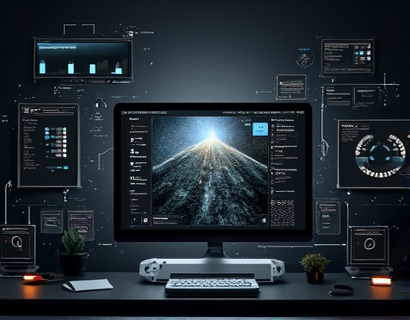AI Chat Interface: Transforming Competitive Gaming Community Engagement
The landscape of competitive gaming and esports is rapidly evolving, driven by technological advancements and the growing demand for immersive, interactive experiences. One of the most significant innovations in this space is the integration of AI-powered chat interfaces, designed to revolutionize how tournament enthusiasts, players, and fans engage with the gaming community. This article delves into the transformative impact of these AI chat interfaces, exploring how they enhance real-time updates, insights, and interactive discussions, ultimately enriching the overall community engagement and accessibility in competitive gaming.
Enhancing Real-Time Updates
One of the primary advantages of AI chat interfaces in competitive gaming is their ability to provide real-time updates. Traditional methods of sharing information, such as through static websites or scheduled social media posts, often fall short in delivering timely and relevant content. AI chat interfaces, however, can instantly push updates to users, ensuring they are always in the loop. Whether it's the latest tournament schedules, player standings, or breaking news, these platforms can disseminate information with unprecedented speed and accuracy.
For instance, during a live tournament, an AI chat interface can provide real-time scores, highlight key moments, and offer instant replays or analysis. This immediacy not only keeps the audience engaged but also enhances their understanding of the game, making the viewing experience more dynamic and interactive. For players and teams, real-time updates can include performance metrics, opponent analysis, and strategic advice, all of which can be crucial during critical moments of a match.
Providing In-Depth Insights
Beyond mere updates, AI chat interfaces can offer in-depth insights that enrich the gaming experience. By leveraging advanced data analytics and machine learning algorithms, these platforms can analyze vast amounts of data to provide meaningful insights. For example, AI can break down player performance, identify trends, and predict outcomes based on historical data. This level of analysis is invaluable for both casual fans and serious enthusiasts who seek a deeper understanding of the game.
For tournament organizers, AI insights can help in refining the event structure, optimizing match schedules, and enhancing the overall production value. For players, these insights can inform training regimens, help in strategizing against specific opponents, and even improve decision-making during games. Fans can benefit from detailed player profiles, team dynamics, and historical performance data, making their engagement more informed and enjoyable.
Facilitating Interactive Discussions
Interactive discussions are a cornerstone of community engagement in competitive gaming. AI chat interfaces take this to a new level by fostering real-time, context-aware conversations. These platforms can recognize and respond to user queries, provide relevant content suggestions, and even facilitate discussions between users. The AI can moderate conversations, ensuring they remain on topic and respectful, which is particularly important in a passionate and sometimes volatile community.
For example, during a live stream or tournament, fans can ask questions directly to the AI, which can then provide instant answers or direct them to relevant resources. This interactive element not only keeps the audience engaged but also creates a more inclusive environment where everyone feels heard and valued. For players and teams, AI can serve as a virtual assistant, handling common inquiries and freeing up time for more critical interactions.
Enhancing Accessibility
Accessibility is a critical aspect of community engagement, and AI chat interfaces play a significant role in making competitive gaming more accessible to a broader audience. For users with disabilities, AI-powered chat interfaces can offer text-to-speech, speech-to-text, and other assistive features that enhance their ability to participate fully. Additionally, these platforms can provide multilingual support, breaking down language barriers and allowing a global audience to engage with the community.
For those in regions with limited internet access or outdated technology, AI chat interfaces can be optimized to function smoothly even on lower-bandwidth connections. This ensures that the gaming community remains inclusive, regardless of geographical or technological constraints. By removing these barriers, AI chat interfaces help build a more diverse and vibrant community.
Personalization and User Experience
One of the most compelling features of AI chat interfaces is their ability to personalize the user experience. By analyzing user behavior, preferences, and interactions, AI can tailor content and recommendations to individual users. This personalization extends to notifications, content feeds, and even the way information is presented. For instance, a user who frequently follows a particular player or team can receive customized updates and highlights, making their experience more relevant and engaging.
Personalization also enhances the overall user experience by reducing information overload. Instead of being bombarded with irrelevant content, users receive only the information that matters to them. This not only improves satisfaction but also encourages longer engagement with the platform. For tournament organizers, personalized experiences can lead to higher user retention and increased participation in events.
Community Building and Moderation
Building a strong, positive community is essential for the long-term success of competitive gaming. AI chat interfaces can play a pivotal role in community building by fostering connections and encouraging collaboration. These platforms can create dedicated spaces for different groups, such as new players, seasoned veterans, or fans of specific games, allowing them to connect and share experiences.
AI moderation tools are also crucial in maintaining a healthy community. By automatically detecting and filtering out toxic behavior, AI can help keep discussions civil and respectful. This not only protects users from harassment but also creates a more welcoming environment for newcomers. Additionally, AI can assist in organizing community events, such as Q&A sessions with players, live chats with industry experts, and fan art contests, further strengthening community bonds.
Data-Driven Decision Making
For tournament organizers and game developers, AI chat interfaces provide valuable data-driven insights that can inform strategic decisions. By analyzing user interactions, engagement patterns, and feedback, these platforms can offer actionable insights into what works and what doesn't. This data can guide decisions on event scheduling, content creation, and even game design improvements.
For example, if certain types of content or features consistently receive high engagement, organizers can focus on expanding these areas. Conversely, underperforming elements can be refined or removed. This data-driven approach ensures that resources are allocated efficiently, maximizing the impact of community engagement efforts. For players and teams, understanding these trends can also inform their strategies and help them stay ahead of the competition.
Challenges and Considerations
While the benefits of AI chat interfaces in competitive gaming are numerous, there are also challenges and considerations to keep in mind. One of the primary concerns is user privacy and data security. AI systems handle vast amounts of personal data, and ensuring this data is protected is paramount. Platforms must implement robust security measures and comply with relevant data protection regulations to build and maintain user trust.
Another challenge is the potential for AI to be perceived as impersonal or intrusive. To mitigate this, it's essential to design AI interactions that feel natural and helpful, rather than robotic or invasive. User feedback should be actively sought and incorporated to continuously improve the AI's performance and user experience.
Finally, the integration of AI chat interfaces should be seamless and user-friendly. Technical issues or a complex user interface can deter users from engaging with the platform. Ensuring that the AI chat is accessible across various devices and platforms, and that it integrates smoothly with existing gaming ecosystems, is crucial for widespread adoption.
Conclusion
The integration of AI chat interfaces in competitive gaming represents a significant leap forward in community engagement and accessibility. By providing real-time updates, in-depth insights, and interactive discussions, these platforms enhance the overall gaming experience for enthusiasts, players, and fans alike. As technology continues to evolve, the potential for AI to transform the gaming community is vast, offering new opportunities for connection, learning, and enjoyment. Embracing these innovations can help build a more vibrant, inclusive, and dynamic gaming world.










































